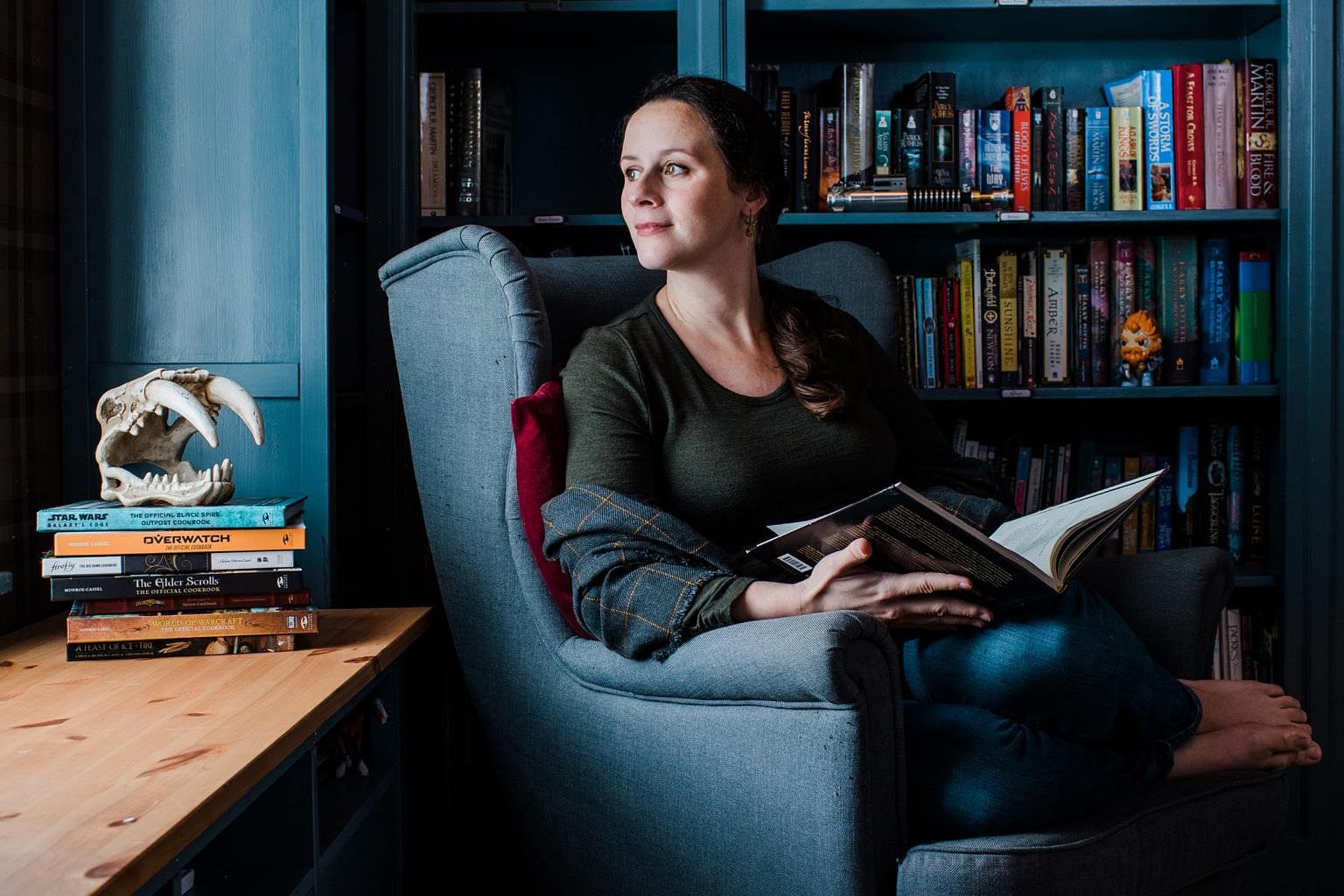NEW YORK (NYTIMES) - Chelsea Monroe-Cassel is developing a recipe for a dish whose traditional version she will never be able to taste, and whose place of origin she will never be able to visit - Plomeek soup, a staple on the fictional planet Vulcan.
In writing The Star Trek Cookbook, out in March 2022, she has spent hours watching old episodes and movies from her home in West Windsor, Vermont, trying to deduce what might be in the reddish soup.
"We know shockingly little about Vulcan cuisine, given how much of a fan favourite Spock is," she said.
The result: "A cold gazpacho with tomato and strawberry and a little bit of balsamic."
Monroe-Cassel, 36, has dedicated her career to bringing to life the food of her favourite television shows, movies and games.
She has written A Feast Of Ice And Fire: The Official Game Of Thrones Companion Cookbook; The Elder Scrolls: The Official Cookbook; Firefly: The Big Damn Cookbook; and World Of Warcraft: The Official Cookbook.
Together, they have sold more than 250,000 copies.
She is not a trained chef, but is hugely enthusiastic about pop culture food. For fans like her, "it is a big way, a new and tangible way, of connecting with a world that they love", she said.
This genre has existed since at least the 1970s, with titles such as The Dark Shadows Cookbook, The Partridge Family Cookbook and The Little House Cookbook from Little House On The Prairie (1974 to 1983).
Of late, these books have grown significantly in popularity and scale. They have found a mainstream audience and contain recipes that many people want to cook.
As streaming platforms have made media both more accessible and social, fans have turned their fascination into full-on lifestyles.
"My generation, to know what people are interested in, you went through their record collection or their library," said Mr Charles Miers, 62, publisher of Rizzoli New York.
"Now, you ask them what TV show they are watching."
While early pop culture cookbooks were more like novelties, titles such as 2002's The Sopranos Family Cookbook, which sold more than 142,000 copies, and 2010's The Unofficial Harry Potter Cookbook, with more than one million books sold, showed this could be a genre in its own right.
Major publishers like Penguin Random House have dedicated teams for pop culture books, which can be officially licensed from the franchise or unofficial.
The cookbooks span subject matter both expected (Bob's Burgers, 2011 to present; Ratatouille, 2007) and eyebrow-raising (The Walking Dead, 2010 to present).
As fan cultures have deepened, these cookbooks have evolved too. Less prevalent are the ones that simply name recipes after characters.
Today's pop culture cookbooks are heavily researched tomes about their fictional worlds.
They consider climates and character motivations. They fill gaps in the narrative.

Authors pore over every element - down to the props in recipe photos - so fans can feel fully immersed.
When chef and writer Nyanyika Banda started working on the upcoming The Official Wakanda Cookbook, based on Marvel's Black Panther comics, she knew Marvel's rabid fan base would expect a high level of detail.
"If we had written this book 15 years ago, you probably could have gotten away with including a lot of things from the entire continent of Africa without giving explanation to why they existed," said Banda, 39.
Her recipes - like chambo, a traditional fish dish from Malawi - speak directly to Wakanda's varying locations in Africa throughout the run of the comics.
She considered the role that colonialism played in adding a Western influence to certain African dishes, and how to explain that influence when she included those foods in the book - as Wakanda is supposed to be isolated from the rest of the world.
The Unofficial Harry Potter Cookbook author Dinah Bucholz said fantasy series such as Harry Potter and Game Of Thrones lend themselves well to cookbooks because the food descriptions tend to be fairly detailed.
"The authors clearly enjoyed writing about food," she said.
"They wrote about it with so much relish. It is such a major part of the characters' lives."
Fans, as a result, have high hopes when trying these foods themselves.
"It is the Narnia problem," said Monroe-Cassel.
"So many kids grow up reading about Turkish delight and thinking, 'I have just got to have this', and they actually have Turkish delight and it is this wild disappointment."
Mr Brendan O'Neill, editor-in-chief of Adams Media, said the demographic for these books tends to be amateur cooks in their 20s to 40s.
But it is unclear what percentage of them are cooking anything.
"I think a lot of people buy the books because they are just fans and collectors," said Ms Jennifer Sims, 47, a senior editor at Insight Editions.
"Then, you have the other half who like cooking and will make just one weekly meal from this particular book or they will throw a viewing party."

